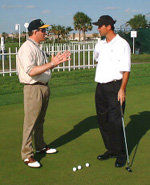
Tips for Long-Term Improvement in Golf
Why do some golfers easily give up on trying to improve their game?
The answer can be summed up in two words.. instant gratification. Instant gratification is the enemy of improvement.
Instant gratification screams “I want it, and I want it NOW!” Golfers have a problem when they fail to see quick progress. That’s when you stop trying altogether.
For example, a golfer who responded to our Golf Mental Game Survey commented on his frustration with not seeing results soon enough:
“I have been working hard on my short game for the past month but I’m not seeing very much improvement. I feel I hit good shots in practice, but I fall into my old ways during competitive rounds. What should I do?”
When you work on your short game but don’t see the results, it is easy to conclude that what you are doing isn’t working or not worth the effort.
You become frustrated and agitated when you are chipping a ball from the sand. Another mishit gives you the evidence to support your belief that you just have a horrible short game and there is nothing you can do about it.
So, what should you do?
The answer may seem simplistic, but you should keep working on your short game.
Working on your short game includes physical practice but also mental practice to help minimize distraction, trust your swing and trust that your training will pay off, especially when the results are not immediate.
The mantra “trust the process” may sound over-used in sports, but it’s that type of patience and determination that produce results in the long run.
When you try to improve an aspect of your game for a small period of time and you conclude its not working or not worth the effort, you give up too soon, your game will plateau, and you will continue to feel frustrated over your lack of improvement and results.
Don’t give up because you haven’t seen instant improvement. Improvement takes time.
Patience and persistence are how Rory McIlroy has approached his putting since resuming Tour play after the coronavirus stay-at-home order. In mid-august of the 2020 season, McIlroy commented on the work he has put in improving his putting.
McILROY: “The last few weeks haven’t really been what I’ve wanted from a golf standpoint on the course and also results-wise and even just practice-wise and technique-wise. I sound like a broken record, but I saw some good signs in practice, and it’s just a matter of it translating out into the competitive arena.”
You can see in McIlroy’s statement that he is putting in the work, tempering his expectations and focusing on the process of improving his putting.
Instant gratification has never helped a golfer develop long-term success.
Improving your game requires patience, persistent effort and perspective that focuses on the process.
How to Improve Your Golf Game:
Do you know why training aids or gimmicks never seem to work quickly or make lasting changes? The reason is that success requires focused, long-term, and persistent work. It takes a minimum of 30-60 days to change a bad habit.
Pick one skill you want to improve in your game. Create a one-month plan for improvement. What do you need to do physically, mentally, and technically to improve that aspect of your game?
Don’t hastily judge your progress but commit to working on improving your skills. Be PATIENT. Be PERSISTENT and focus on your objectives, one day at a time!
Related Golf Psychology Articles
- The Instant Gratification Trap and Its Negative Effects on Performance
- How to Dedicate Yourself to the Game of Golf
- How to Manage Negative Thoughts
- Subscribe to The Golf Psychology Podcast on iTunes
- Subscribe to The Golf Psychology Podcast on Spotify
Golf Mental Coaching Programs

All golf psychology programs include the Golfer’s Mental Aptitude Assessment (GMAP), a custom Mental Game Plan, weekly coaching sessions, unlimited email correspondence, and The Golfer’s Mental Edge 2.0 workbook program.
One-on-one mental coaching is the fastest and most effective method to improve your mental game, boost your performance, and make lasting changes!
We have unique mental coaching programs, customized for you. Please contact us with any questions your have about our programs. Provide your name, email, and role below:
Or Call us today at 888-742-7225 | Mental Game Success Stories